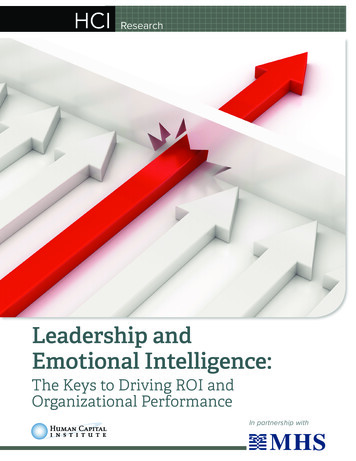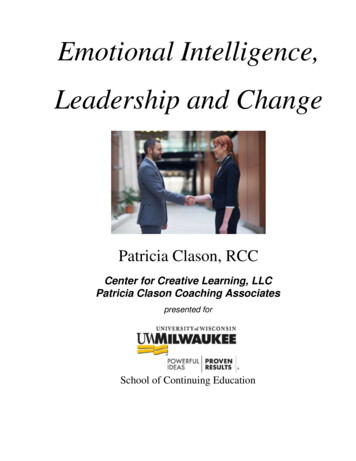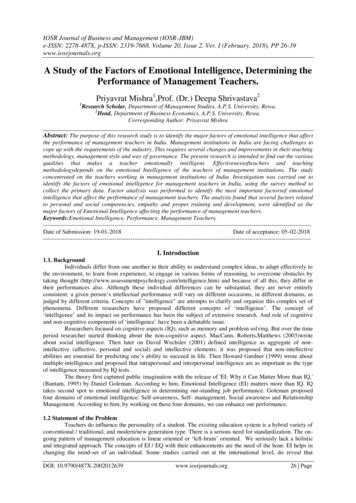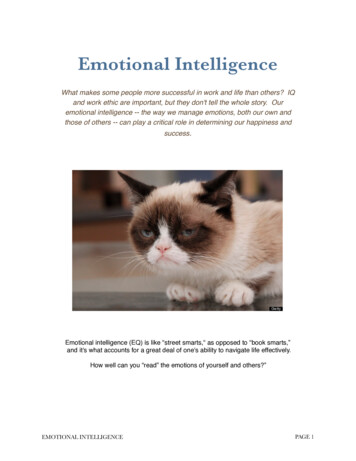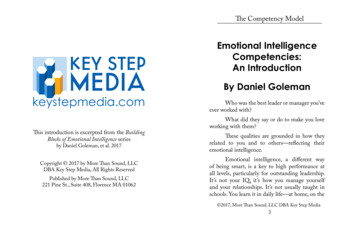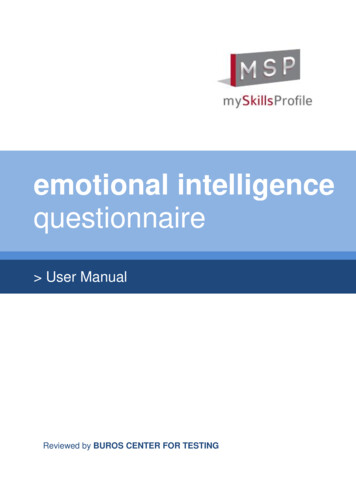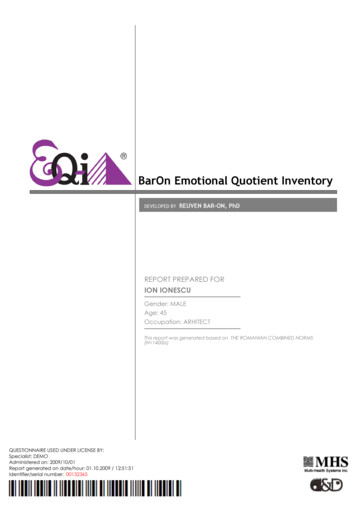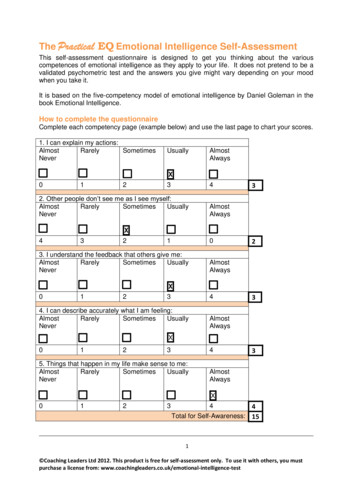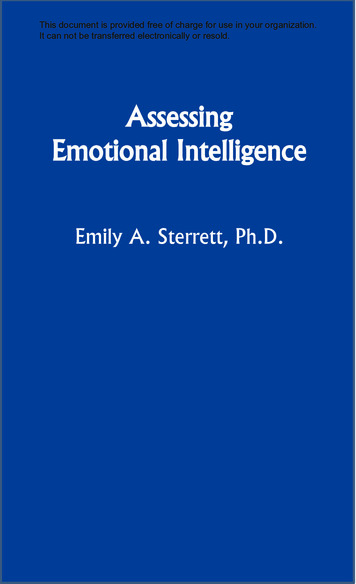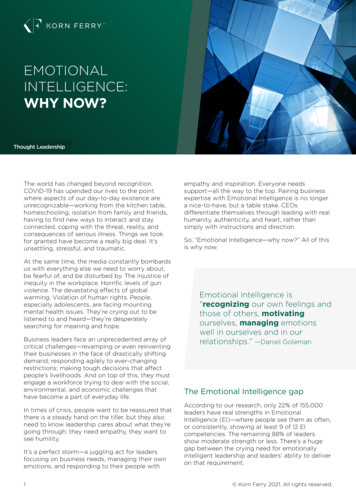
Transcription
EMOTIONALINTELLIGENCE:WHY NOW?Thought LeadershipThe world has changed beyond recognition.COVID-19 has upended our lives to the pointwhere aspects of our day-to-day existence areunrecognizable—working from the kitchen table,homeschooling, isolation from family and friends,having to find new ways to interact and stayconnected, coping with the threat, reality, andconsequences of serious illness. Things we tookfor granted have become a really big deal. It’sunsettling, stressful, and traumatic.At the same time, the media constantly bombardsus with everything else we need to worry about,be fearful of, and be disturbed by. The injustice ofinequity in the workplace. Horrific levels of gunviolence. The devastating effects of globalwarming. Violation of human rights. People,especially adolescents, are facing mountingmental health issues. They’re crying out to belistened to and heard—they’re desperatelysearching for meaning and hope.Business leaders face an unprecedented array ofcritical challenges—revamping or even reinventingtheir businesses in the face of drastically shiftingdemand; responding agilely to ever-changingrestrictions; making tough decisions that affectpeople’s livelihoods. And on top of this, they mustengage a workforce trying to deal with the social,environmental, and economic challenges thathave become a part of everyday life.In times of crisis, people want to be reassured thatthere is a steady hand on the tiller, but they alsoneed to know leadership cares about what they’regoing through; they need empathy, they want tosee humility.It’s a perfect storm—a juggling act for leadersfocusing on business needs, managing their ownemotions, and responding to their people with1empathy and inspiration. Everyone needssupport—all the way to the top. Pairing businessexpertise with Emotional Intelligence is no longera nice-to-have, but a table stake. CEOsdifferentiate themselves through leading with realhumanity, authenticity, and heart, rather thansimply with instructions and direction.So, “Emotional Intelligence—why now?” All of thisis why now.Emotional Intelligence is"recognizing our own feelings andthose of others, motivatingourselves, managing emotionswell in ourselves and in ourrelationships.” —Daniel GolemanThe Emotional Intelligence gapAccording to our research, only 22% of 155,000leaders have real strengths in EmotionalIntelligence (EI)—where people see them as often,or consistently, showing at least 9 of 12 EIcompetencies. The remaining 88% of leadersshow moderate strength or less. There’s a hugegap between the crying need for emotionallyintelligent leadership and leaders’ ability to deliveron that requirement. Korn Ferry 2021. All rights reserved.
Thought LeadershipFigure 1The distribution of EI strengths among leaders.Certainly, healing responses need to start withempathy—with listening to, recognizing, andunderstanding the feelings of others, particularly,in those cases where people have been impacteddirectly, or even vicariously, from an issue orevent. People cannot begin to solve problems ormove forward while they feel unheard.Even before these recent traumatic events,organizations were experiencing a heightenedneed for EI in day-to-day business.As the pace of change and emergence of newkinds of competitors require more agility,adaptability, and innovation from organizations,the need for EI also increases. Adaptability itself isa form of EI and is required of almost everyone inan organization, if constantly changing demandsare to be met. Innovation is the most fragile typeof performance and is highly responsive to thequality of relationships and communication withmanagers, teammates, and internal or externalclients. Again, EI is key.And then there are generational disparities to addinto the mix. The younger generations ofemployees expect more meaning andengagement in their work—and if they don’t findit, they’ll move on. Providing meaning and evokingengagement are two-way communication tasks—and therefore are dependent on EI—to understandthe team’s reactions and to provide theleadership, coaching, and other communicationsthat produce meaning and engagement. Forleaders to help people to understand thesignificance of their cog in the wheel, and toinspire their contribution, especially in these toughtimes, takes a level of understanding and ability torelate like never before.Emotional Intelligence and theemotional and social competenciesEmotional Intelligence can sound daunting—something you either have or you don’t—butreally, it’s simply a set of competencies, each ofwhich can be developed.Dan Goleman’s highly regarded book EmotionalIntelligence brought the whole issue of this subject,and the research behind it, to public attention. Hisfollow-up book, Working with Emotional Intelligence,focused specifically on how different aspects of EIunderpin outstanding work performance. Thissecond publication incorporated substantialcompetency research led by David McClelland atMcBer and Hay Group (now part of Korn Ferry) inthe 1960s, through the 1990s. McClelland andMcBer/Hay Group investigated competencies—thepersonal characteristics, thought patterns, andbehaviors that distinguished outstandingperformance from typical. McBer’s 200 studiescovered the full spectrum of roles from policeofficers to riverboat deckhands, to seniorexecutives, identifying competencies thatgenerally included substantial emotional and/orsocial components. At this point, EI wasconceptualized as being composed of, andexpressed by, discrete emotional competencieswhich fit together in a certain way. Deeper“My biggest skill is an ability to work with people. An ability to buildrelationships with people, and relationships built on trust, relationships builton can-do that are completely open and transparent.”—Australian woman CEO on the importance of emotional intelligent leadership2 Korn Ferry 2021. All rights reserved.
Thought Leadershipqualities, such as Self-Awareness function asnecessary precursors to other groups ofcompetencies, as shown in the graphic below.Figure 2The Emotional and Social Competency Inventory(ESCI) model.A recent analysis confirmed that there is a directrelationship between Emotional Self-Awarenessand the quality of the climate the team. Leaderswho have strong Emotional Self-Awareness (thestarting point of the ESCI model) are more likelyto create a climate that their teams see asenabling excellence and high-performance.Figure 3Leaders with high Emotional Self-Awareness aremore likely to create excellent climates.Emotional Intelligence research has continued onan ever-widening range of roles andorganizations, across all continents, with theexception of Antarctica. Some of this researchused qualitative interview methods similar to thefoundational research incorporated in Working withEmotional Intelligence. One such example isdetailed in the book, The Indian CEO: a Portrait ofExcellence, which describes a study of 30 of thebest CEOs in India.An extensive line of research uses the Emotionaland Social Competency Inventory (ESCI), a 360degree survey co-developed by Richard Boyatzis,Dan Goleman, and Hay Group. This covers themost frequently seen emotional and socialcompetencies. Most of the research includesvarious independent measures of performance,according to the role and organization. Over time,these measures became increasingly forwardlooking. For example, the emerging strategicchallenges of an organization were identified, andthen “outstanding” performers would be thosewho were already successful in addressing thosechallenges, regardless of the person’s previousperformance against other measures. In recentyears, this research has integrated insights anddata regarding neurological and neuro-endocrinesystems as part of Emotional Intelligence.3Another study found that employees at poorperforming companies were 79 percent morelikely to have low overall Emotional SelfAwareness than those at firms with robust Returnon-Resources (ROR).The Emotional and SocialCompetency Inventory 360The ESCI is a 360-degree feedback tool, with fiverater categories. The 360 survey format waschosen because it is closest to the day-to-daypractical value of EI—its effect on other people. Ina 360-degree survey, it’s important to maintainanonymity so that raters can be frank and honest.The ESCI achieves this by requiring at least tworaters in every category except the “manager."As stated on the Korn Ferry website:At an individual level, the ESCI—oftencombined with coaching—can help leaders andkey contributors determine what outstandingperformance means for them within their roleand decide which competencies they want towork on. The ESCI is not intended for use in HRresource management activities: selection,promotion, salary decisions, etc.The benefit of the 360 format is that it providesindividuals with nuanced feedback about theeffect they have on different groups of peoplearound them. Like any 360 survey, it should never Korn Ferry 2021. All rights reserved.
Thought Leadership“I was hit in the face with the epiphany that as a leader, I did not need tohave all the answers, but in fact, if I surrounded myself with people whowere smarter than me in critical areas, we could collectively move ourbusiness much further and faster.”— CEO describing a key moment of her Self-Awareness and its implications.be used for selection, performance management,or other consequential HR decisions. It is certainlynot a measure of performance. The ESCI is designedfor development—to be used to help people improvetheir work and their lives, and the effect they have onthose they interact with.Figure 4The ESCI database.There are some important things to know aboutthe ESCI:1. The emotional and social competencies arelearnable. Even empathy has been found to beteachable, with good real-world performanceresults. Korn Ferry has produced guides fordeveloping these competencies.2. A powerful first step to development ispersonal feedback, such as that provided bythe ESCI.3. The ESCI, as an instrument, has beenthoroughly researched and validated acrosscultures, and in many roles. It has strongpsychometric properties.5. The ESCI, focuses on the most frequent andmost useful emotional competencies, withoutintending to provide an exhaustive catalog. Wealso recognize that not all twelvecompetencies are relevant to every role, atevery time. This is one reason individualcoaching is so powerful in developingcompetencies—to help focus efforts wherethey will be most productive.6. Korn Ferry is committed to using ESCI dataonly for the purposes that were disclosed tothe participants and raters when the data wascollected (as with all our assessment data).Is Emotional Intelligence a panacea for all ofsociety’s troubles? Of course not. Does it addressall the deep and detailed context of people’s livesand work? It most certainly does not. EI, and theESCI, focus on what we, as individuals, candirectly influence—our own responses to thesituations we face. The idea of EI, the powerfulfeedback of the ESCI, and the personalizedcoaching that follows it, call forth the nobility ofthe human spirit to care for others and work tomake people’s lives better in ways that theythemselves want.So, here’s the challenge. The stress and traumathat affects us all makes Emotional Intelligenceharder. At the same time everyone needs to betreated with care, empathy, and respect, nowmore than ever. Paradoxically, by digging for ourdeepest values and reaching for our highestpurpose, so as to give meaning and hope toothers, we may find that we strengthen and evenheal ourselves, as well.4. The tool has been used extensively across theglobe. Many of Korn Ferry’s clients use itrepeatedly due to the considerable value theyderive from it.4 Korn Ferry 2021. All rights reserved.
Thought LeadershipAuthorsReferencesSigne SpencerClient Research Partner,Korn Ferry InstituteBoyatzis, R. E., Gaskin, J., & Wei, H. (2015).Emotional and social intelligence and behavior. InS. Goldstein, D. Princiotta, & J. A. Naglieri (Eds.),Handbook of intelligence: Evolutionary theory,historical perspective and current concepts. NewYork, NY: Springer Science and Business Media.Heather BarnfieldSenior Director, Intellectual Property DevelopmentKorn Ferry InstituteEmmerling, R., & Boyatzis, R. (2012). Emotionaland social intelligence competencies: Crosscultural implications. Cross Cultural Management,19(1), 4-18.Korn Ferry. (2017). ESCI research guide and technicalmanual. Los Angeles, CA: Korn Ferry Institute.Korn Ferry. (2017). Women CEOs speak. LosAngeles, CA: Korn Ferry Institute.Korn Ferry. (2018). Australian women CEOs speak.Los Angeles, CA: Korn Ferry Institute.Korn Ferry. (2019). The Black P&L leader. LosAngeles, CA: Korn Ferry Institute.Korn Ferry. (2020). CEOs for the future. LosAngeles, CA: Korn Ferry Institute.Goleman, D. (1995). Emotional intelligence. NewYork, NY: Bantam Books.Goleman, D. (1998). Working with emotionalintelligence. New York, NY: Bantam Books.Reiss, H. (2018). The empathy effect. Boulder, CO:Sounds True Press.Spencer, L., & Spencer, S. (1993). Competence atwork. New York , NY: John Wiley and Sons.Spencer, S., Rajah, T., Narayan, S. A., Mohan, S., &Lahiri, G. (2007). The Indian CEO (ResponseBooks). New Delhi, India: Sage.Zes, D., & Landis, D. (n.d.). A better return on selfawareness. Korn Ferry Briefings . New York, NY:Korn Ferry Institute.About Korn FerryKorn Ferry is a global organizational consultingfirm. We work with our clients to design optimalorganization structures, roles, and responsibilities.We help them hire the right people and advisethem on how to reward and motivate theirworkforce while developing professionals as theynavigate and advance their careers.5 Korn Ferry 2021. All rights reserved.
Emotional Intelligence can sound daunting— something you either have or you don’t—but really, it’s simply a set of competencies, each of which can be developed. Dan Goleman’s highly regarded book Emotional Intelligence brought the whole issue of this subject, and the research behind
